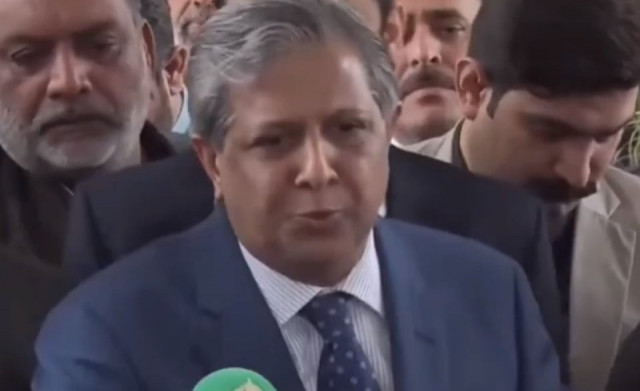Tarar for avoiding conflict of interests
Says new tribunal members should not hear tax cases due to past affiliations

Law Minister Azam Nazir Tarar has advised the newly appointed members of appellate tribunals dealing with billions of rupees worth of tax matters to recuse themselves from hearing cases where the conflict of interests arises because of their past professional affiliations.
The minister spoke to The Express Tribune after questions were posed about the conflict of interests in the case of some of the appellate tribunal members. "When the question of conflict of interests arises, the newly appointed members will choose the option of 'not before me'," Tarar said.
Instead of appointing new members of the Inland Revenue appellate tribunal through the Federal Public Service Commission (FPSC), the government in January this year constituted a three-member selection committee.
Among the committee members were Justice (Retired) Mushir Alam, Major General (Retired) Naveed Ahmad, who is a member of the FPSC, and Asim Zulfiqar, a senior partner of AF Ferguson chartered accountancy firm.
On the recommendation of the committee, the federal cabinet has so far appointed 15 members from March to May this year.
The newly appointed members have been given salaries equal to judges but they are not independent like the judges, said Dr Ikramul Haq, a senior lawyer at the Supreme Court of Pakistan. He also questioned the selection process, saying there were questions about some of the members' competency and conflict of interests.
The members should either work under high courts or the Supreme Court instead of working under the executive branch, he suggested.
To a question about bypassing the FPSC, the law minister said the selection process had been outsourced to management consulting firm AT Kearney "for ensuring independence" in the process.
To another question how to ensure transparency and objectivity in deciding the cases if some of the tribunal members have worked with tax advisory firms, Tarar replied "we believe that these are mature people and will take care of the conflict of interests".
The minister said that whenever such a situation arises, the members should exercise the "not before me" right to avoid hearing cases being pleaded by tax firms where they have worked in the past. The Ministry of Law has made these appointments under Section 130 of the Income Tax Ordinance, 2001.
The law states that a person shall be eligible to be appointed as a member of the Appellate Tribunal, if he is an advocate of a High Court for not less than 15 years and possesses such other qualifications as may be prescribed by rules under this section; has for a period not less than 10 years practiced professionally as a chartered accountant and has for a period not less than 10 years practiced professionally as a cost and management accountant.
An officer of the Inland Revenue in BS-21 or above; or an officer of the Inland Revenue in BS-20, having served in such a grade for three years or more, is also eligible for these appointments.
The prime minister decided to appoint all these members from the private sector to address the issue of conflict of interests. There had also been incidents in the past where the Federal Board of Revenue (FBR) used to influence the outcome of cases, although the members were working under the administrative control of the law ministry.
About Rs4 trillion in revenues are stuck at various levels – most of which before the commissioners appeal of the FBR and the appellate tribunals. The FBR and the office of the Attorney General of Pakistan had assured the PM to at least recover about Rs400 billion before June. Similar assurances had also been given to the IMF.
However, so far no major breakthrough has been achieved, except in the case of windfall tax.
A recent IMF report stated that the Pakistani authorities were actively pursuing the resolution of outstanding cases. It said efforts were being made to recover Rs367 billion out of a total of Rs770 billion under dispute. These included cases pending before the Supreme Court involving Rs43 billion, high courts in Islamabad, Sindh and Lahore involving Rs217 billion and the Appellate Tribunal Inland Revenue Rs104 billion.
The report disclosed that the IMF had been assured that the Supreme Court had completed its initial hearing, with a final decision expected by mid-April. A favourable ruling could effectively resolve related cases worth an estimated Rs120 billion, according to the report.
The IMF's view was that resolving the cases would help clarify the legality of the disputed claims, thereby supporting future revenue by reducing uncertainty and discouraging future litigation.
The appointments of the new members have already been challenged in courts for the lack of transparency.
According to media reports, the Islamabad High Court (IHC) has issued an interim order on the appointment of members in the Appellate Tribunal Inland Revenue, stating that all appointments would be subject to the final outcome of a writ petition.
Earlier, the IHC issued notices to the Ministry of Law secretary, FPSC chairman and Attorney General of Pakistan following a constitutional petition challenging the appointment process of tribunal members.
The petition challenges the unadvertised process of "head hunting" and the lack of transparency. It alleges that the appointment process did not follow the established rules and procedures.





















COMMENTS
Comments are moderated and generally will be posted if they are on-topic and not abusive.
For more information, please see our Comments FAQ